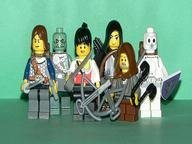Quiz Answer Key and Fun Facts
1. Most role-players have at some point encountered this type of player; the guy whose only interest in the game is for his character to amass the biggest bonuses, be able to deliver the most damage per round and have the "best" equipment available. When not engaged in a fight, they seldom take an active role in the game, but as their characters seldom have much depth or personality to them and little or no background story, this may be quite natural! What's this type of player often called?
2. When a Game Master (GM) is said to be "railroading", what is he/she doing?
3. A "Dungeon Crawl" is any kind of relatively simple adventure, where the focus is on the characters fighting their way through a closed environment, with little emphasis on plot or social interaction between characters.
4. Role-players often mention "die", as a noun ("a die"). What exactly are they talking about?
5. An "NPC" is something role-players encounter fairly often, in every game. What hides behind this abbreviation?
6. The term "Party-wipe" is used to describe a person who is disrupting the social aspects of the game, so people are not having a good time. Examples: by being loud and rude, constantly whining, or trying to lure players away from the game to do something else.
7. Occasionally, GMs like to introduce their own house rules in the game, or even try out entire home-made game systems. Rules like these are sometimes referred to as "home ____".
8. Your GM announces that his upcoming campaign will include a lot of "hall-play". What does he mean by that?
9. "Metagaming" is something most serious players frown upon. Which of these situations would be described as metagaming?
10. One thing that many GMs can find very difficult to manage, is the so-called "Power Creep". But what is the correct definition of this term?
Source: Author
Twotallgnome
This quiz was reviewed by FunTrivia editor
Bruyere before going online.
Any errors found in FunTrivia content are routinely corrected through our feedback system.
